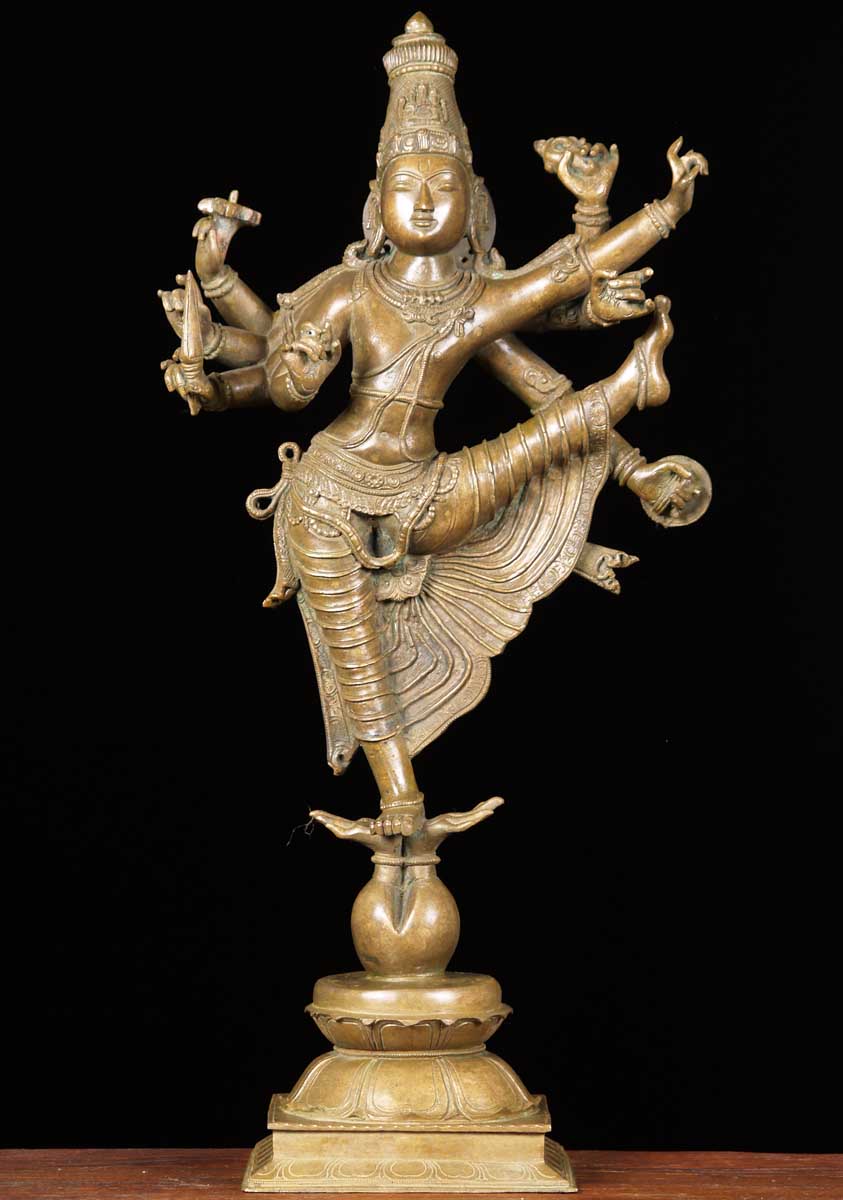Pancha Tattva (Devanagari: पञ्चतत्त्व; IAST: pañca-tattva, from Sanskritpañca meaning 'five' and tattva 'truth' or 'reality') in the Gaudiya Vaishnava tradition of Hinduism refers specifically to the Five aspects of God or Absolute Truth.
Background[edit]
In Gaudiya Vaishnavism these five features of God (Krishna) are believed to have incarnated on Earth as five people in the late 15th century, Chaitanya Mahaprabhu, Nityananda, Advaita Acharya, Gadadhara Pandit and Srivasa Thakur. They famously spread the Krishna mantra and the practice of devotion (bhakti) towards Krishna throughout India.
The Five Features[edit]
- Chaitanya Mahaprabhu is Krishna Himself, The Supreme Person (Svayam Bhagavan).
- Nityananda is Krishna's first personal expansion with the combined power of Balarama
- Advaita Acharya is the combined power of Lord Vishnu & Lord Shiva (Harihara).
- Gadadhara is the combined power of Krishna's internal energy.
- Srivasa is Krishna's pure devotee and symbolizes devotion.
POOJAN VIDHI: Shaligram is worshipped like one worships Lord Vishnu. Normally tulsi is used essentially and also a counch shell (Shankh) is also kept near the Shaligram. Daily worship with purity of heart and body is required to get full benefits from Shaligram.
'I bow down to Lord Krishna, who appears as a supreme devotee (Lord Chaitanya), as His personal expansion (Sri Nityananda), His acharya Sri Advaita), His devotee (Sri Srivasa), and His energy (Sri Gadadhara), and who is the source of strength for the devotees.' (Chaitanya CharitamritaAdi 1.147.6)
Vishnu Yoga Shala Offers 200 hour and 100 hour Yoga Teacher Training Courses aimed at providing a strong foundation in pranayama, meditation, philosophy, correct yoga postures and yogic lifestyle. 200 hour/ 100 hour Yoga Teacher Training at Vishnu Yoga Shala is beneficial for anyone looking to deepen their knowledge, begin their yoga journey. Siva is distinct from Brahma, Vishnu and Rudra. 26 SIVA TATTVA 34. Lord Siva is the Lord of innumerable crores of Brahmandas or worlds. Isvara united with Maya gives rise to Brahma, Vishnu and Rudra out of Rajas, Sattva and Tamo Gunas respectively, under the command of Lord Siva. Brahma, Vishnu and Rudra are the trinities of the world.
Pancha Tattva mantra[edit]
Within the Gaudiya tradition a mantra formed from the names of the five members of the Pancha Tattva is often spoken or sung as a means of devotional worship or japa. Often this mantra is sung or chanted prior to the Krishna mantra. It is believed by followers to be the most merciful mantra available in this age of Kali.
- śrī-kṛṣṇa-caitanya prabhu-nityānanda,
- śrī-advaita gadādhara śrīvāsādi-gaura-bhakta-vṛnda[1]
See also[edit]
References[edit]
- Rosen, Steven J. Sri Pancha Tattva: The Five Features of God 1994 ISBN0-9619763-7-3 Folk Books, New York
Vishnu is the preserver and upholder of dharma in Hinduism. He is the supreme self in Vaishnavism and one of the three supreme deities (trimurti) in Hinduism. Vishnu in essence means the giver and provider of things.
Along with Brahma, the creator and Shiva, the destroyer, Lord Vishnu is one of the three main male deities in Hinduism and they are together known as the TRIMURTI. Being a part of the Trinity, He has taken ten incarnations to save the planet and the good people from the hands of evils, demons or Asuras time and again. Lakshmi, the Hindu goddess of wealth, fortune and prosperity, is the wife and active energy of Vishnu. When Lord Vishnu incarnated on the Earth as the avatars : Rama and Krishna, Lakshmi incarnated as his respective consorts : Sita (Rama’s wife) and Rukmini (Krishna’s wife).
According to the extant Hindu texts and traditions, Lord Vishnu is considered to be resident in the direction of the “Makara Rashi” (the “Shravana Nakshatra”), which is about coincident with the Capricorn constellation. In some of the extant Puranas and Vaishnava traditions, Vishnu’s eye is considered to be situated at the infinitely distant Southern Celestial Pole.
- Also known as Narayana (means the dweller of water and the dweller of human beings), Vasudeva and Hari, Lord Vishnu is usually depicted as a pale blue being having the dark complexion of water-filled clouds and having four arms. His incarnations of Rama and Krishna also have a similar depiction.
- He holds a ‘padma’ (lotus flower) in his lower left hand, the ‘Kaumodaki gada’ (mace) in his lower right hand,
- the ‘Panchajanya shankha’ (conch) in his upper left hand and
- the ‘Sudarshana Chakra’ ( the discus weapon) which is considered to be the most powerful weapon according to Hindu Religion, in his upper right hand.
- Vishnu’s mount (Vahana : on which the Lord Vishnu travels) is Garuda, the eagle. Vishnu is commonly depicted as riding on his shoulders.
The actual number of Vishnu’s auspicious qualities is countless, although his six most-important “divine glories” are :
- ‘Jnana’ (Omniscience), defined as the power to know about all beings simultaneously.
- ‘Aishvarya’ (Sovereignty), derived from the word ‘Ishvara’ which means unchallenged rule over all.
- ‘Shakti’ (Power or Energy), the capacity to maintain or challenge dharma.
- ‘Bala’ (Strength), the capacity to support everything by will and without any fatigue.
- ‘Virya’ (Vigour), the power to retain immateriality as the Supreme Spirit or Being in spite of being the material cause of mutable creations.
- ‘Tejas’ (Splendor), which expresses self-sufficiency and the capacity to overpower everything by spiritual effulgence.
- Other important qualities attributed to Vishnu are :Gambhirya (inestimatable grandeur), Audarya (generosity) and Karunya (compassion).

We know for a fact that the divine powers listen to our prayers when made from the core of the heart. So, to pray with a pure heart and mind is very important. According to ‘Bhagavatham’, “Of the different types of prayers, the prayers to Lord Vishnu are best.”
Lord Vishnu Mantras & Slokas
Maha Vishnu Mantra
Suklam Baradharam Vishnum
शुक्लाम्बरधरंविष्णुंशशिवर्णंचतुर्भुजम् ।
Kayena Vaca Manasendriyairvaa

कायेन वाचा मनसेंद्रियैर्वा
Shaantakaaram Bhujagashayanam
शान्ताकारंभुजगशयनंपद्मनाभंसुरेशं
Sa Sankha Chakram Sa Kirita

सशङ्खचक्रंसकिरीटकुण्डलं
The other important mantras to please Lord Vishnu are as follows :
Mukti (Liberation) Mantra
This twelve letter mantra is also known as the liberation mantras as it is believed to relieve the person who is chanting this mantra from all the hardships of life.
In Sanskrit

ॐ नमो भगवते वासुदेवाय
In English
Shri Vishnu Mantra
“Om Namo Bhagavate Vasudevaya”
Meaning: ‘I bow to the Lord who lives in the hearts of all.’
Benefit: Chanting of this Mantra develops compassion. The divine light awakens kindness and love within the one who recites and helps him to overcome challenges easily.
Narayana Mantra – Vishnu Mool Mantra
It is a simple, yet powerful mantra to please the preserver, Lord Vishnu and is also known as Vishnu Mool Mantra.
In Sanskrit
ॐ नमो नारायण
In English
“Om Namo Narayanaya”
Meaning: “I bow before the Almighty.” Benefit : Whoever chants the mantra reaches the ultimate goal of Vaikuntha planet where one attains eternal blissful life. Vaikuntha means ‘no desires’ and it is the supreme spiritual abode. It is said that there is nothing that exists beyond Vaikuntha.
Benefit: Chanting this Mantra to Lord Vishnu frees one from material and physical attachments. He will no longer be afraid of loss, aging and death.
The Ultimate Vishnu Mantra
This mantra depicts about the avatars of Lord Vishnu that He has taken to save the world from evils through different ages and periods.
“Om shreem krishnaya shreem
shreem shreem govindaya gopalaya goloka
sundaraya sathyaya nithyaya paramathmane paraya
vykhanasaya vyrajamoorthaye

meghathmane shreem narasimhavapushe namah”
Benefit : Chanting this mantra for 91 days ensures maximum protection for one. It clears one’s heart of negative emotions and helps atone for past karma. It wards off evil and blesses him with prosperity, wealth, wisdom and success in all aspects of life.
Shri Vishnu Mantra
In Sanskrit
त्वमेवमाताचपितात्वमेवत्वमेवबन्धुश्चसखात्वमेव ।
त्वमेवविद्याद्रविणम्त्वमेवत्वमेवसर्वम्ममदेवदेव ॥
In English
“Tvameva Maataa Ca Pitaa Tvameva Tvameva Bandhush-Ca Sakhaa Tvam-Eva
Tvameva Viidyaa Dravinnam Tvam-Eva Tvameva Sarvam Mama Deva Deva”
Meaning: ‘O God, Thou art my father and mother
Also art thou my friend and brother.
The object of wealth and education,
In thee I see my hope and salvation.’
Benefit: Recitation of this Mantra helps the devotee gain more concentration power while Maha Vishnu himself stays in favour of him and guides him through every aspect of life.
Therefore, to bring all the blessings of Lord Vishnu into one’s life, he should chant these mantras with utmost faith and concentration. It also enhances intuitive power and increases one’s wisdom, peace of mind as well as giving one an inner radiance.
However, to get the results that one hopes for, he should keep in mind the following points :
Vishnu Mantras For Success
- One should freshen up before beginning the prayer service.
- One should Devote oneself completely to Lord Vishnu and open himself to the positivity of the Universe.
Vishnu Mantra Youtube
Devotees should, hence, chant effortlessly and regularly, and the changes will surely happen as Lord Vishnu would shower on them his blessings and protect them from anything evil.
